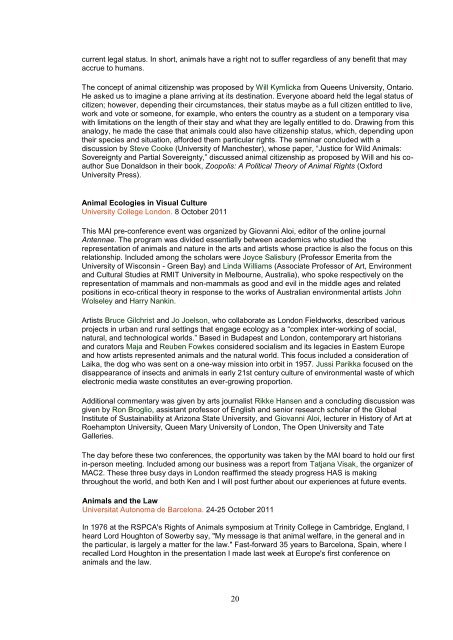News Bulletin - Australian Animal Studies Group
News Bulletin - Australian Animal Studies Group
News Bulletin - Australian Animal Studies Group
Create successful ePaper yourself
Turn your PDF publications into a flip-book with our unique Google optimized e-Paper software.
current legal status. In short, animals have a right not to suffer regardless of any benefit that may<br />
accrue to humans.<br />
The concept of animal citizenship was proposed by Will Kymlicka from Queens University, Ontario.<br />
He asked us to imagine a plane arriving at its destination. Everyone aboard held the legal status of<br />
citizen; however, depending their circumstances, their status maybe as a full citizen entitled to live,<br />
work and vote or someone, for example, who enters the country as a student on a temporary visa<br />
with limitations on the length of their stay and what they are legally entitled to do. Drawing from this<br />
analogy, he made the case that animals could also have citizenship status, which, depending upon<br />
their species and situation, afforded them particular rights. The seminar concluded with a<br />
discussion by Steve Cooke (University of Manchester), whose paper, ―Justice for Wild <strong>Animal</strong>s:<br />
Sovereignty and Partial Sovereignty,‖ discussed animal citizenship as proposed by Will and his coauthor<br />
Sue Donaldson in their book, Zoopolis: A Political Theory of <strong>Animal</strong> Rights (Oxford<br />
University Press).<br />
<strong>Animal</strong> Ecologies in Visual Culture<br />
University College London. 8 October 2011<br />
This MAI pre-conference event was organized by Giovanni Aloi, editor of the online journal<br />
Antennae. The program was divided essentially between academics who studied the<br />
representation of animals and nature in the arts and artists whose practice is also the focus on this<br />
relationship. Included among the scholars were Joyce Salisbury (Professor Emerita from the<br />
University of Wisconsin - Green Bay) and Linda Williams (Associate Professor of Art, Environment<br />
and Cultural <strong>Studies</strong> at RMIT University in Melbourne, Australia), who spoke respectively on the<br />
representation of mammals and non-mammals as good and evil in the middle ages and related<br />
positions in eco-critical theory in response to the works of <strong>Australian</strong> environmental artists John<br />
Wolseley and Harry Nankin.<br />
Artists Bruce Gilchrist and Jo Joelson, who collaborate as London Fieldworks, described various<br />
projects in urban and rural settings that engage ecology as a ―complex inter-working of social,<br />
natural, and technological worlds.‖ Based in Budapest and London, contemporary art historians<br />
and curators Maja and Reuben Fowkes considered socialism and its legacies in Eastern Europe<br />
and how artists represented animals and the natural world. This focus included a consideration of<br />
Laika, the dog who was sent on a one-way mission into orbit in 1957. Jussi Parikka focused on the<br />
disappearance of insects and animals in early 21st century culture of environmental waste of which<br />
electronic media waste constitutes an ever-growing proportion.<br />
Additional commentary was given by arts journalist Rikke Hansen and a concluding discussion was<br />
given by Ron Broglio, assistant professor of English and senior research scholar of the Global<br />
Institute of Sustainability at Arizona State University, and Giovanni Aloi, lecturer in History of Art at<br />
Roehampton University, Queen Mary University of London, The Open University and Tate<br />
Galleries.<br />
The day before these two conferences, the opportunity was taken by the MAI board to hold our first<br />
in-person meeting. Included among our business was a report from Tatjana Visak, the organizer of<br />
MAC2. These three busy days in London reaffirmed the steady progress HAS is making<br />
throughout the world, and both Ken and I will post further about our experiences at future events.<br />
<strong>Animal</strong>s and the Law<br />
Universitat Autonoma de Barcelona. 24-25 October 2011<br />
In 1976 at the RSPCA's Rights of <strong>Animal</strong>s symposium at Trinity College in Cambridge, England, I<br />
heard Lord Houghton of Sowerby say, "My message is that animal welfare, in the general and in<br />
the particular, is largely a matter for the law." Fast-forward 35 years to Barcelona, Spain, where I<br />
recalled Lord Houghton in the presentation I made last week at Europe's first conference on<br />
animals and the law.<br />
20


